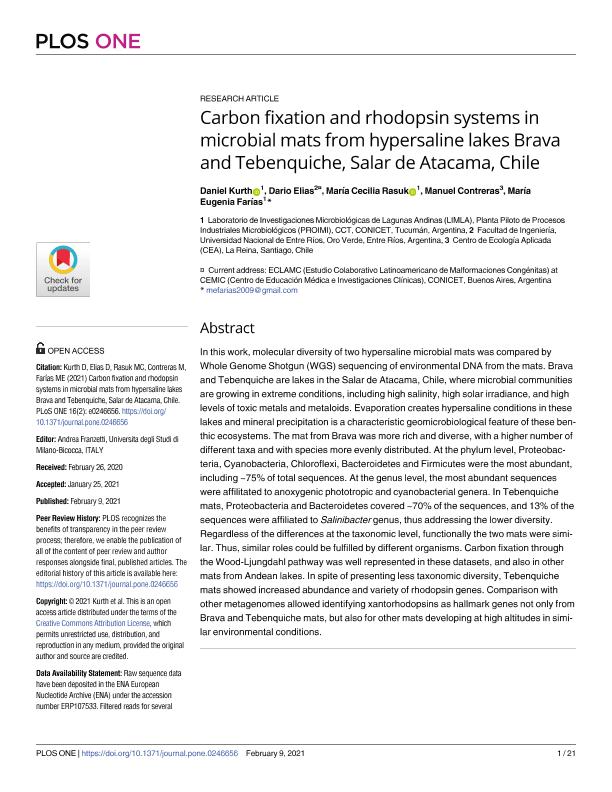Mostrar el registro sencillo del ítem
dc.contributor.author
Kurth, Daniel German

dc.contributor.author
Elias, Dario Ezequiel

dc.contributor.author
Rasuk, Maria Cecilia

dc.contributor.author
Contreras, Emanuel

dc.contributor.author
Farias, Maria Eugenia

dc.date.available
2021-06-15T14:32:47Z
dc.date.issued
2021-02
dc.identifier.citation
Kurth, Daniel German; Elias, Dario Ezequiel; Rasuk, Maria Cecilia; Contreras, Emanuel; Farias, Maria Eugenia; Carbon fixation and rhodopsin systems in microbial mats from hypersaline lakes Brava and Tebenquiche, Salar de Atacama, Chile; Public Library of Science; Plos One; 16; 2 February; 2-2021; 1-21
dc.identifier.issn
1932-6203
dc.identifier.uri
http://hdl.handle.net/11336/133893
dc.description.abstract
In this work, molecular diversity of two hypersaline microbial mats was compared by Whole Genome Shotgun (WGS) sequencing of environmental DNA from the mats. Brava and Tebenquiche are lakes in the Salar de Atacama, Chile, where microbial communities are growing in extreme conditions, including high salinity, high solar irradiance, and high levels of toxic metals and metaloids. Evaporation creates hypersaline conditions in these lakes and mineral precipitation is a characteristic geomicrobiological feature of these benthic ecosystems. The mat from Brava was more rich and diverse, with a higher number of different taxa and with species more evenly distributed. At the phylum level, Proteobacteria, Cyanobacteria, Chloroflexi, Bacteroidetes and Firmicutes were the most abundant, including ~75% of total sequences. At the genus level, the most abundant sequences were affilitated to anoxygenic phototropic and cyanobacterial genera. In Tebenquiche mats, Proteobacteria and Bacteroidetes covered ~70% of the sequences, and 13% of the sequences were affiliated to Salinibacter genus, thus addressing the lower diversity. Regardless of the differences at the taxonomic level, functionally the two mats were similar. Thus, similar roles could be fulfilled by different organisms. Carbon fixation through the Wood-Ljungdahl pathway was well represented in these datasets, and also in other mats from Andean lakes. In spite of presenting less taxonomic diversity, Tebenquiche mats showed increased abundance and variety of rhodopsin genes. Comparison with other metagenomes allowed identifying xantorhodopsins as hallmark genes not only from Brava and Tebenquiche mats, but also for other mats developing at high altitudes in similar environmental conditions.
dc.format
application/pdf
dc.language.iso
eng
dc.publisher
Public Library of Science

dc.rights
info:eu-repo/semantics/openAccess
dc.rights.uri
https://creativecommons.org/licenses/by-nc-sa/2.5/ar/
dc.subject
Extremophile
dc.subject
metagenomic
dc.subject
salt pads microbiology
dc.subject
carbone fixation
dc.subject.classification
Biología Celular, Microbiología

dc.subject.classification
Ciencias Biológicas

dc.subject.classification
CIENCIAS NATURALES Y EXACTAS

dc.title
Carbon fixation and rhodopsin systems in microbial mats from hypersaline lakes Brava and Tebenquiche, Salar de Atacama, Chile
dc.type
info:eu-repo/semantics/article
dc.type
info:ar-repo/semantics/artículo
dc.type
info:eu-repo/semantics/publishedVersion
dc.date.updated
2021-06-10T19:24:12Z
dc.journal.volume
16
dc.journal.number
2 February
dc.journal.pagination
1-21
dc.journal.pais
Estados Unidos

dc.journal.ciudad
San Francisco
dc.description.fil
Fil: Kurth, Daniel German. Consejo Nacional de Investigaciones Científicas y Técnicas. Centro Científico Tecnológico Conicet - Tucumán. Planta Piloto de Procesos Industriales Microbiológicos; Argentina
dc.description.fil
Fil: Elias, Dario Ezequiel. Consejo Nacional de Investigaciones Científicas y Técnicas. Oficina de Coordinación Administrativa Parque Centenario. CEMIC-CONICET. Centro de Educaciones Médicas e Investigaciones Clínicas "Norberto Quirno". CEMIC-CONICET; Argentina
dc.description.fil
Fil: Rasuk, Maria Cecilia. Consejo Nacional de Investigaciones Científicas y Técnicas. Centro Científico Tecnológico Conicet - Tucumán. Planta Piloto de Procesos Industriales Microbiológicos; Argentina
dc.description.fil
Fil: Contreras, Emanuel. Centro de Ecología Aplicada (CEA); Chile
dc.description.fil
Fil: Farias, Maria Eugenia. Consejo Nacional de Investigaciones Científicas y Técnicas. Centro Científico Tecnológico Conicet - Tucumán. Planta Piloto de Procesos Industriales Microbiológicos; Argentina
dc.journal.title
Plos One

dc.relation.alternativeid
info:eu-repo/semantics/altIdentifier/doi/https://doi.org/10.1371/journal.pone.0246656
dc.relation.alternativeid
info:eu-repo/semantics/altIdentifier/url/https://journals.plos.org/plosone/article?id=10.1371/journal.pone.0246656
Archivos asociados
